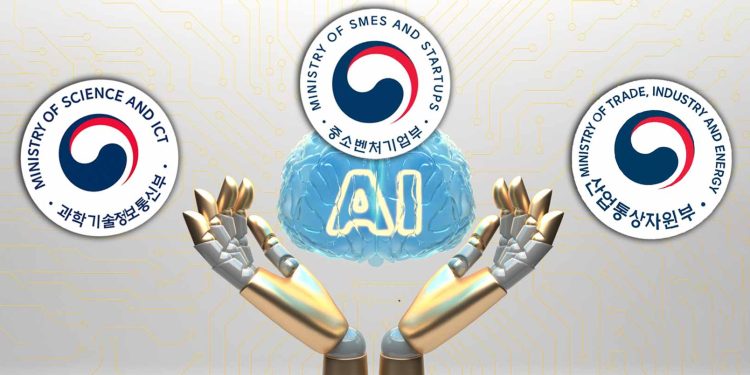Korea’s industrial transformation is accelerating beyond digitalization — it’s entering the age of AI transformation and autonomy. With a historic budget expansion and inter-ministerial alignment, the government is redefining how SMEs and startups adopt AI across factories, innovation hubs, and supply chains, setting the stage for smarter, faster, and globally connected industries.
Korea Scales Up AI Transformation with Inter-Ministerial Strategy
South Korea has announced a further aggressive push to expand its AI Transformation (AX) initiative across industries, marking a decisive step in the nation’s transition toward a digitally autonomous economy.
The Ministry of SMEs and Startups (MSS) will lead the effort in collaboration with the Ministry of Science and ICT (MSIT) and the Ministry of Trade, Industry and Energy (MOTIE). Under this joint policy drive, the government will raise the 2026 budget for AI transformation programs to KRW 455.2 billion (~ USD 337 million), an 83.6% increase over the previous year.
This initiative aims to strengthen Korea’s smart manufacturing capacity, foster next-generation AI ventures, and expand AI education for small business owners nationwide.
Building a Foundation for AI-Driven Industrial Innovation
The announcement was formalized during the “Inter-Ministerial Agreement on Expanding AI Transformation Across Industries” held in Seoul on October 15, 2025. The agreement reflects Korea’s long-term commitment to integrating AI technologies across its economic base — from manufacturing and services to retail and micro-enterprises.
MSS Minister Han Seong-sook stated that the country’s SMEs and small business operators now face a pivotal moment.
“SMEs and small business owners are in a situation where survival depends on the ability to adopt and utilize AI. We will focus on AI-based manufacturing innovation, the growth of AI ventures and startups, and the broader use of AI among small businesses.”
The initiative forms part of the government’s Smart Manufacturing Innovation 3.0 Policy, a next-generation framework designed to help SMEs transition toward AI-autonomous factories through Vertical AI models customized by industry.
Policy Measures and Budget Expansion
The 84% budget increase will finance a series of nationwide projects to help manufacturing SMEs implement AI-powered production systems, upgrade smart factory infrastructures, and develop sector-specific AI capabilities.
The MSS will also pursue the enactment of a Smart Manufacturing Industry Promotion Act to institutionalize AI-based innovation. The law is expected to strengthen legal and financial support for SMEs integrating automation, analytics, and AI tools into daily operations.
At the same time, the government is advancing its NEXT UNICORN Project Fund, a KRW 13.5 trillion (~ USD 9.8 billion) investment program to nurture next-generation AI startups.
The fund aims to deepen collaboration between large enterprises and innovative AI ventures through open innovation models targeting real market demand in areas such as manufacturing, logistics, and healthcare.
AI Transformation for Small Businesses and Local Manufacturers
Minister Han Seong-sook also highlighted that the AI transformation strategy is not limited to high-tech enterprises. It will also extend to small-scale manufacturers and self-employed business owners.
“We will launch structured AI education programs to enhance the digital literacy of small business operators. By merging field expertise with digital tools, we will cultivate a new class of smart artisans capable of blending traditional craftsmanship with intelligent production.”
The ministry’s plan includes regional support programs to ensure that AI transformation reaches SMEs outside major industrial hubs, reflecting the government’s emphasis on inclusive innovation across both metropolitan and provincial economies.
Laying the Groundwork for AI-Enabled Competitiveness
The AX initiative is emerging as a cornerstone of Korea’s broader industrial digitalization strategy, linking SMEs, startups, and large corporations under a unified innovation framework.
The government’s focus on cross-ministerial cooperation marks a shift toward long-term sustainability in digital policy execution — ensuring that technological benefits extend throughout the supply chain.
By strengthening the collaboration between the MSS, MSIT, and MOTIE, Korea is establishing a comprehensive AX ecosystem that integrates:
- Core AI technology development and industry adoption.
- Commercialization pathways for AI startups and SMEs.
- Regional AX ecosystems centered on strategic industries.
- Consistent alignment with national AI policy objectives.
The government also aims to build a comprehensive AX support system, linking fundamental R&D, industrial applications, and startup-led diffusion. This structure will enable small and medium-sized manufacturers to transition toward predictive, data-driven, and autonomous production environments, narrowing the competitiveness gap with global industrial leaders.
Korea’s AI Transformation as a Global Model
Minister Han Seong-sook eventually expressed confidence that this multi-agency collaboration will become a model for public-private innovation.
“This partnership will allow SMEs, startups, and small business owners to leverage the AI technologies and infrastructure developed by the government and large corporations. Through continued cooperation, we expect AI to be successfully integrated across all industries, unlocking new opportunities for sustainable growth.”
Korea’s rapid budget expansion and policy alignment underscore its ambition to position itself as an Asia-Pacific AI innovation hub.
As industrial digitalization accelerates, the AX initiative is expected to redefine how Korean SMEs compete and collaborate globally, paving the way for a new phase of smart manufacturing, AI entrepreneurship, and ecosystem-wide resilience.
🤝 Looking to connect with verified Korean companies building globally?
Explore curated company profiles and request direct introductions through beSUCCESS Connect.
– Stay Ahead in Korea’s Startup Scene –
Get real-time insights, funding updates, and policy shifts shaping Korea’s innovation ecosystem.
➡️ Follow KoreaTechDesk on LinkedIn, X (Twitter), Threads, Bluesky, Telegram, Facebook, and WhatsApp Channel.





